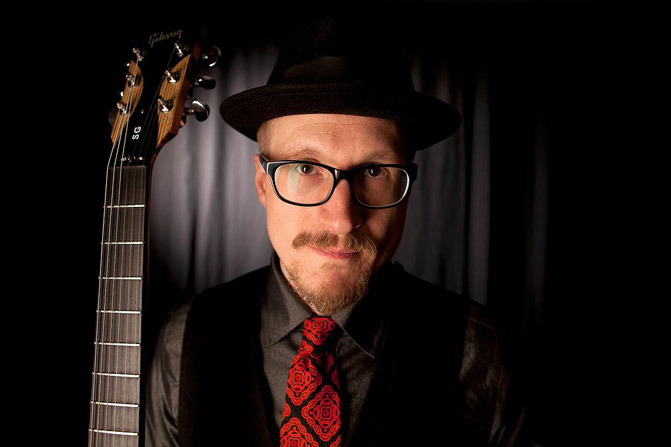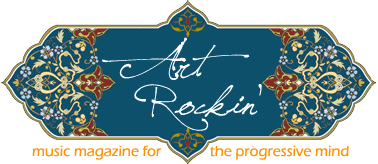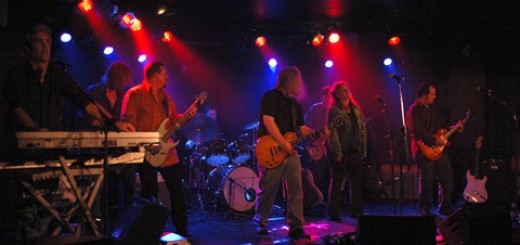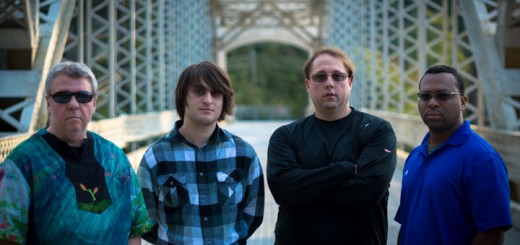Pontus Gunve: The Magician of Rich Melodic Canvases of Sound
By: Salim Ghazi Saeedi (*)
Have you – like me – missed Pontus H.W.  Gunve’s magic of melting contradictory modes and impressions into rich melodic canvases? Go and grab a bunch (Not forgetting your friends) of it! ‘cause you are missing big time! To my honor here we sit with Pontus Gunve (www.phwgmusic.com) at Art Rockin’ magazine.
Gunve’s magic of melting contradictory modes and impressions into rich melodic canvases? Go and grab a bunch (Not forgetting your friends) of it! ‘cause you are missing big time! To my honor here we sit with Pontus Gunve (www.phwgmusic.com) at Art Rockin’ magazine.
Welcome to Art Rockin’ Magazine, Pontus! Could you please introduce yourself and tell our readers what made you to become a guitarist?
The reason I picked up a guitar to begin with was my fascination with a short fellow in an little know Aussie rock band called AC DC . There was just something really powerful in the instrument that grabbed me – and it wasn’t just the guitar that got to me – it was the combination of an electric guitar going into a high powered energy source that made it so appealing. The sound of overdriven tubes, raw energy, components and parts inside a box that could produce some of the most powerful and LOUD sound sources was (and still is) a very appealing thing to me. Before I even bought a guitar I became obsessed with different kinds of guitars and often the players I admired steered me into picking the guitar of choice. The Gibson SG was high on the I WANT list – but by budget only allowed me getting a Peavey made Fender Black and White Strat copy – pretty much the one that Dave Murray played in the mid 80’s.
In search of good music I always go after meaningful music; and it is rarely there. Sure the actualization of pleasure through “meaningful melody” does not require virtuosity (which in your case you are virtuoso!) or composition’s complexity or even superb recording quality (which in your case it is superb!). How do you create meaning by your axe?
Great question. How does one create meaning by one’s instrument? I think this has really changed over the years. I feel like when I first started playing the goal was always to be as flashy – amazing – and fast, especially as a guitar player who was really into hard rock and metal. So the first few years really was a study of how to sound like all the players I really liked. I sort of see this as a study period of sorts where you just need to gather the stuff necessary to gain the technique and skills to make this language sound and read as fluid as possible. It takes many years to really SPEAK on a guitar – if that makes sense. Growing up I felt like there were tons of guitarist that sounded like this person or that person (that guy can play exactly like Yngiwe Malmsteen or Kirk Hammett or Randy Rhodes or Van Halen). Finding one’s own sound or personality on an instrument and through your music is a whole different story. You kind of want to figure out what it is that you want to do with the guitar before you can really speak or express yourself through the instrument. I like honesty in music – I want to be told a story and I want to be taken somewhere at the end of a piece.
Today I use my guitar as a way to tell a story – and that story is mostly non verbal. I actually never really hear the words in music with vocals – I mainly hear the melody. I wouldn’t really be able to tell you what any song is about – I just listening to where the melody takes me and how that makes sense in a larger picture of the piece. I find meaning thought my instrument when I can use it to compose everything around it.
Which musicians have influenced your guitar playing and what musicians have influenced your music composition?
Wow – there are many. I remember someone that I really wanted to play like early on was Marty Friedman (mainly for his work in Rust In Peace) . He had this amazing fluidity and used scales that was taken from around the world / but somehow made it really fit in a Metal setting. I started getting into the flashier players early on – so Steve Vai, Marty Friedman, Jason Becker, Yngwie Malmsteen. I was into players that would expend your horizon – and take you somewhere at the end of it / someone that can transform you from your 25 minute bus ride to school or work into a whole new dimension and make you get completely surounded by the musical journey. Then all of a sudden the -15C / 6:45am/ snow covered bus ride won’t be as long But some composers that sticks out right now to have helped me shape my current sound and idea include Jean Michel Jarre, Mikael Akerfeldt, Philip Glass, James Hetfield, Steve Harris – basically a combination of heavy rock bands and composers I would say.
Your careful choice of sounds reminds me of Eric Johnson. What do you think?
Thank you . I can see that . It was never really meant to be his sound or anything – but Eric Johnson has this amazing fluid and creamy tone – that just sits perfectly in the mix. It’s the perfect blend of ingredients in an amazing dish – nothing really pierces out but instead works in perfect harmony. My sound has really changed over the years – I was very much in tuned to the guitar sound of Trash and Death metal earlier in my life. The Trash metal had that smiley face sound – no Mids . Now I am looking for that same creamy tone – because writing music for many instruments require everything to have its place in the mix and place to breathe.
Since I am an eastern born myself, I am interested to know who you came across eastern music? Has it been merely through music listening or you may have been or are in contact with eastern culture too?
My curiosity for eastern music was mostly introduced to me through guitarists or bands like Marty Friedman or Steve Vai who used notes / scales / phrases from Eastern music. I have also traveled to India quite a few times and have taken sitar lessons there in the past. It was mainly to help me understand the philosophy and uses of the instrument and scales and also to broaden my guitar playing (and really opened up bending notes). I’m also very intrigued by percussion instruments and patterns and the Tabla might be on top of my favorite list. It’s a very expressive instrument and can really add this energy to a mix and also stand on it’s own.
What is your general composition routine? Do you isolate yourself and write all the instruments alone or you complete the work in a jam?
I don’t really have a strict routine but rather a intense spur of ideas that come and go. But I have blocks and moments where it’s very intense – I sort of live and breathe that project then. I just don’t put it away – even when I’m not writing it – I’m reviewing it, editing it, putting parts here and there – in my head and by listening to it on my phone… Subway rides and walks to and from giving private lessons are filled with moments of editing and listening to what moves me, grabs me and what sounds like it works in the context of things. I do sometimes try different ways of trying new compositional ways. For my CD The Observer I wrote one piece “Kraken” in 7 hours based on one simple video clip I took at the New York Aquarium in Coney Island. I basically locked myself in my studio for a day with no outside influence (no email/ phone/ or what not) . The biggest challenge is that I write on the computer so had to disable my internet connection and put my phone away not to get distracted. I usually write out all the parts on my own – the cello and violin parts are mostly written on the guitar first and then transposed into cello and violin mode. I usually have a pretty good idea on how everything sounds together first before recording it – so if I have written something new I often try it live and then see what works and not. I will on occasion try somethings with my band or other musicians and see what really works together.
Since you are a sound designer, and some of our readers may not be aware of this profession, would you enunciate the reason music industry needs sound designing?
The world around us and all we perceive as the world of music is connect to sound. I’m not sure I see the separation between a composer and a sound designer to some degree. When I merge the two its the idea of story telling and moving somewhere with music and sound that is really my goal.
Would you tell us about your participation at Battle of The Boroughs competition?
The Battle of the Boroughs was really a fun experience. It’s an annual music competition for New York based musicians and it was an honor just to get into the first stage. The coolest part is that you will find bands and acts from all genres and styles and it is in front of a live radio audience and a panel of 3 judges . The next step is a voting and judge review to move on to the top five bands of Brooklyn.
What have been your highlights in film music?
I can’t really think of anything right now. Each project I do is a learning experience and has it’s unique quality.
Where is your favorite part of the world? What has been its possible influence on your music?
I don’t really have a favorite part of the world to be honest. Just as I appreciate food from all over the world – I appreciate the variety this world have to offer.
I have often though of what the surrounding around me have to do with my music. With The Observer I named it such because I often feel like my music is reflective of my surrounding. I try to paint a picture of my surrounding / basically tell you the story of where you are or how this might feel and give an impression of the different sounds in the worked. Three of my centers of inspiration in this world would be 1.) New York – but specifically moving through New York on foot while passing everything around me while listening to music. 2.) My fathers backyard in Sweden. Think Swedish country side / with no one else around you – the sound of silence / preferably with no electrical sounds / no power generators – just the sounds of whats around you. I tend to use this place to absorb and listen to my surrounding. 3.) Calcutta, India – my wife is from Calcutta – which brought me there. I really enjoy the soundscape of Kolkata – it’s a really rich, dense, and vibrant sound scape / filled with everything from people, animals, cars, traffic – as I write this I’m sitting in Kolkata just listening to the cars beeping and going by while a group of kids are playing Cricket on the street. And in the distance I can hear the crows mixed with the namas prayers and sort of the rest of the sounds that make up this sound painting. Just as a music mix can be dense, light, open, closed, big, small, focused, blurred, so can the sound scape around you be complicated, simple, delicate, rough, oppressive, freeing, ETC ETC. The most important thing is really to listen – and get an appreciation for the world around you. Any new place or even the place you are used to and live everyday will have this surrounding you. Its amazing that the biggest and most expensive block buster films will give you an absolute bombardment of odic texture – everything has to be filled at every single moment .
What was the last book you read? How do you think literature can influence a composer’s mind?
I mostly read non fiction books – the last book I read must have been Ray Kurzweil’s The Singularity is Near. Saying that I do believe literature really tickle the imagination of people and opens up worlds that are sometimes not the readers reality. It can move you, grab you, take you places in any time, at any point imaginable to the writer and reader. I feel that music should do the same – it should do something to you – take you somewhere. Non lyrical music really needs to be that – music that gives room for thought / imagination / and a place for you to go.
Where can we see you live?
I currently play mostly in the New York area – but please see my Facebook page (facebook.com/phwg) for updates on my live shows.
Thanks for your time!
(*) Salim Ghazi Saeedi is an Iranian composer and guitarist mostly known in avant-prog and rock in opposition genres. www.salimworld.com
112





Recent Comments